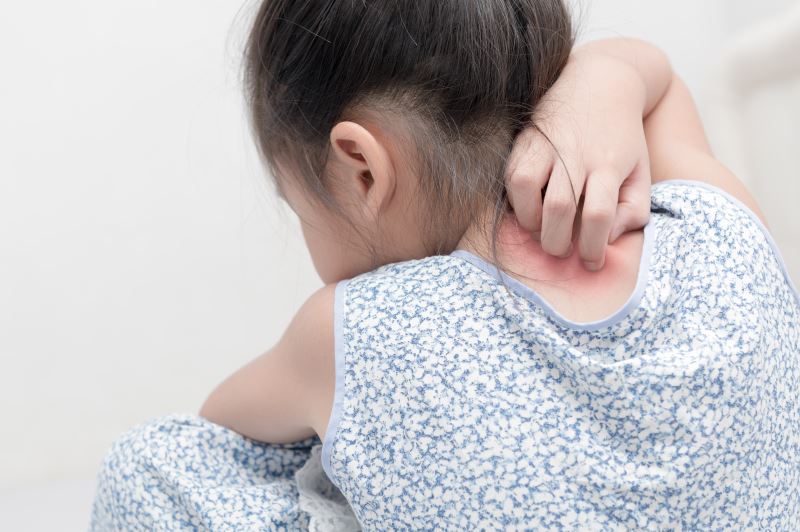If your child is suffering from psoriasis, you could notice different changes in their symptoms that are determined by the weather and the season. Factors such as humidity levels, temperature shifts, and exposure to sunlight can affect your child’s skin. More so, you might observe that several psoriasis triggers become more common at particular times of the year. So, what is psoriasis? Psoriasis is an autoimmune condition that causes skin inflammation, itchy plaques, or sore patches of dry, thick, and discolored skin.
Although any part of your child’s skin can be affected, psoriasis mainly develops on the scalp, elbows, knees, feet, palms, and face. Like other auto-inflammatory illnesses, this condition arises when the immune system starts attacking its healthy cells instead of attacking infectious germs. This guide will discuss the causes, symptoms, and treatment of psoriasis.

Symptoms of Psoriasis
Plaques of psoriasis range from few dandruff-like spots to enormous eruptions that occupy large regions. The symptoms and appearance of the disease will depend on the type of psoriasis and its severity. Here are some common symptoms:
- Cracked or dry skin that bleeds
- Swollen joints
- Itching, soreness, or burning near the affected regions
- Raised skin plaques or discolored patches that are covered with scales
- Thickened or pitted toenails or fingernails
Causes of Psoriasis
Generally, psoriasis is a hereditary condition that is passed down the generations. Furthermore, risk factors such as obesity could increase the likelihood of contracting psoriasis. An outbreak of psoriasis can be provoked by:
Stress
Stress is the main trigger for people who have psoriasis. The condition flares up very easily when a person is under stress and improves when they are relaxed. As a parent, to manage this situation better, encourage your child to participate in meditation, yoga, and regular exercise. This may help manage the symptoms of psoriasis.
Cold weather
If your child suffers from psoriasis, you should consider taking them on a trip to warmer climates during the cold winter months. The reason is that the sun’s ultraviolet rays can turn off the immune system of your child’s skin, which is overactive. Consult your dermatologist before you travel to get tips for sun safety. Also, limit your child to less than 10 minutes of direct exposure to direct sunlight per day.
Vaccinations
Anything that punctures your child’s skin can cause a flare-up of psoriasis. However, this should not discourage you from having your child vaccinated. The main thing to bear in mind here is that if your child is on a psoriasis treatment that suppresses their immunity (for example, a biological treatment), they should not take a live vaccine. This is because their body may fail to fight against a live virus due to the treatment they’re taking. Therefore, check with your child’s doctor if there is a vaccine that has a deactivated virus.
Treatment of Psoriasis
Psoriasis cannot be cured, but there are some effective psoriasis treatment options that can be used to control the condition. Before using these medications, consult your doctor regarding the benefits and potential risks of any therapy that your child will use.
Medication
Some medications can be used to suppress the symptoms of psoriasis in your child. They include:
- Prescriptions like topical steroids and over-the-counter medications can be directly applied to your child’s skin to reduce the symptoms of psoriasis. They can take the form of lotion, gel, shampoo, or ointments.
- These are systemic medications that affect the whole immune system of your child. They are usually administered as injections.
- Oral retinoids. This is a form of systemic therapy administered to people with severe psoriasis who have failed to respond to other treatments.
Light therapy
Light therapy involves exposing your child’s skin to controlled amounts of natural and artificial UV light to decrease the symptoms of psoriasis. This treatment is usually administered in combination with other medications.




Psoriasis sach me bahut ziddi problem hai, aur stress sabse bada reason
Main bhi is issue se guzar chuki hu, abhi to cure hai per sab treatment le kar dekh liya
Baccho k liye to ya aur painful hota hoga
Maine bahut test karwaya, steroids injection liya per kuch din hi relief mila per steroids k side effects ka soch kar yehi pain bare karna thik laga